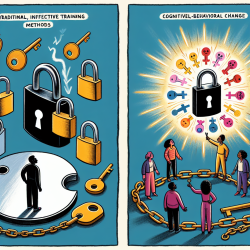In the ever-evolving field of psychology, the importance of evidence-based assessment (EBA) cannot be overstated. At the heart of effective EBA lies a crucial skill—clinical reasoning. Despite its significance, clinical reasoning often remains underexplored in training programs and professional practice. This blog post delves into the findings of the research article "Clinical Reasoning: A Missing Piece for Improving Evidence-Based Assessment in Psychology" by Wilcox, Schroeder, and Drefs, highlighting key insights and actionable strategies for practitioners.
Understanding Clinical Reasoning
Clinical reasoning is the cognitive process that enables psychologists to make sense of complex data during assessments. It involves forming hypotheses, testing them against diagnostic criteria, and generating solutions. This skill is vital for ensuring diagnostic accuracy and delivering meaningful recommendations that improve client outcomes.
The Current Challenge
Despite its importance, clinical reasoning is often overshadowed by a focus on standardized testing and psychometric properties in training programs. As a result, practitioners may lack the necessary skills to integrate diverse data sources effectively. This gap can lead to misdiagnoses and inadequate treatment plans.
Strategies for Improvement
To enhance clinical reasoning skills, practitioners can adopt several strategies:
- Seek Feedback: Actively seek feedback throughout the assessment process to identify areas for growth. Negative feedback is particularly valuable for recognizing blind spots.
- Embrace Deliberate Practice (DP): Engage in DP by setting specific learning objectives, seeking coaching, and refining skills through repetition. DP has been shown to improve performance across various fields.
- Frame Assessments Broadly: Avoid narrow hypotheses that limit data collection. Consider multiple hypotheses to reduce confirmation bias and improve diagnostic accuracy.
- Utilize Base Rates: Incorporate base rate information into decision-making to enhance diagnostic accuracy. Be mindful of potential biases when interpreting data.
- Prioritize Recommendations: Collaborate with clients to prioritize recommendations and address potential barriers to implementation.
The Path Forward
The journey to mastering clinical reasoning is ongoing. Practitioners must remain committed to continuous learning and self-reflection. By embracing these strategies and engaging with current research, psychologists can enhance their clinical reasoning skills and deliver more effective assessments.
For those interested in deepening their understanding of clinical reasoning in psychology, further exploration of the original research paper is encouraged. To read the original research paper, please follow this link: Clinical Reasoning: A Missing Piece for Improving Evidence-Based Assessment in Psychology.










